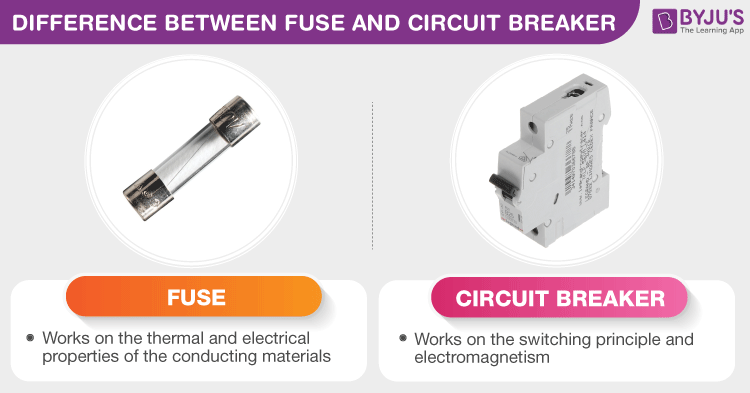Fuses and circuit breakers are critical components of an electrical system. Both fuses and circuit breakers are used to interrupt the excess electricity in a circuit. However, there are some key differences in the way they function.
One of the fundamental differences between a fuse and a circuit breaker is that a fuse is a metal piece that melts when excess current overloads the circuit. In contrast, a circuit breaker has an internal switch that gets tripped when there is excess current in the circuit from an overload or short circuit.

| Table of Contents |
What Is a Fuse?
We define fuse as an electrical safety device that removes electrical current from an electrical circuit when the current in the electrical circuit is too high.
What Is Circuit Breaker?
We define a circuit breaker as an automatically operated electrical switch that is designed to protect an electrical circuit from damage caused by an excess amount of current due to overload or short circuit. The basic function of a circuit breaker is to interrupt current flow after a fault is detected.
Fuse finds application in electronic equipment that requires very low current, while the circuit breakers find application in heavy machines or electronic equipment that requires a large amount of current.
Fuse vs Circuit Breakers
| Fuse | Circuit Breaker |
| Works on the thermal and electrical properties of the conducting materials | Works on the switching principle and electromagnetism |
| It doesn’t give any indication of overloads | It gives an indication of overloads |
| Fuse can only be used once | A circuit breaker can be used many numbers of times |
| Provides protection against power overloads | Provides protection against power overloads and short circuits |
| It detects and interrupts faulty circuit conditions | It performs the interruption process only. Faults are detected by a relay system. |
| Low breaking capacity compared to the circuit breaker | High breaking capacity |
| Automatic operation | Can either be automatic or manually operated |
| Operating time of fuse is 0.002 seconds | Operating time of the circuit breaker is 0.02 – 0.05 seconds |
| Low Cost | High Cost |
Most houses use circuit breakers nowadays due to their many advantages. Fuses are used widely in motor protection circuits due to their simplicity and small size.
| Similar Articles |
Frequently Asked Questions – FAQs
What is a fuse?
What is a circuit breaker?
What is the common function of both fuse and circuit breaker?
What is the key difference between a fuse and a circuit breaker?
What is an electrical circuit?
Learn more differences with the help of interactive video lessons by downloading BYJU’S – The Learning App.

Thank you. This is very helpful.
helpfull